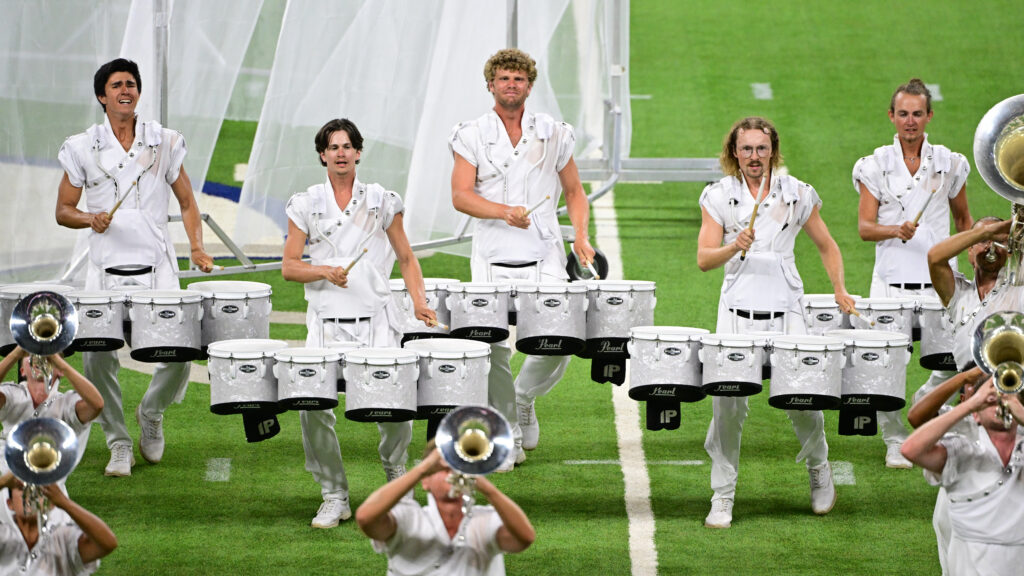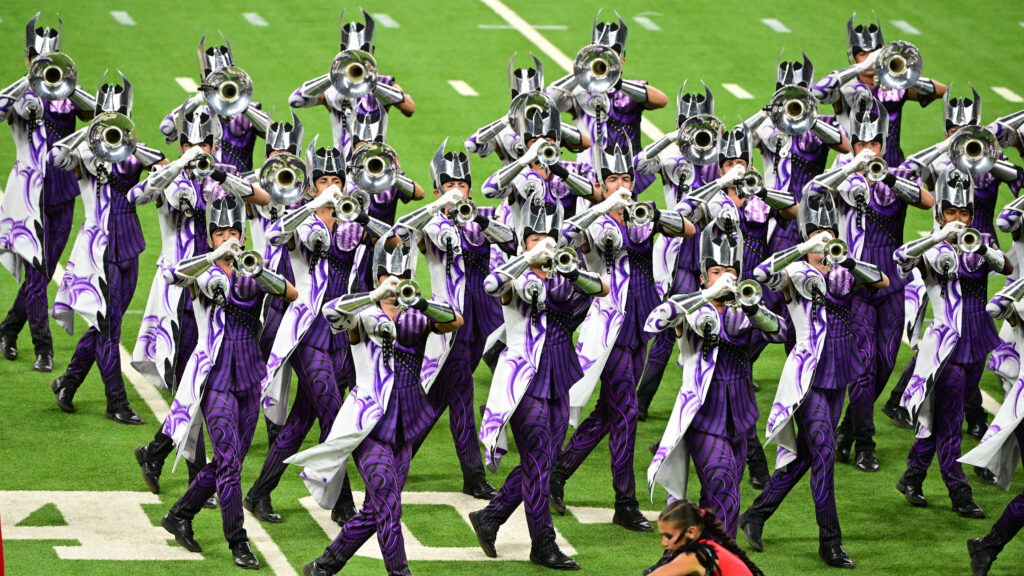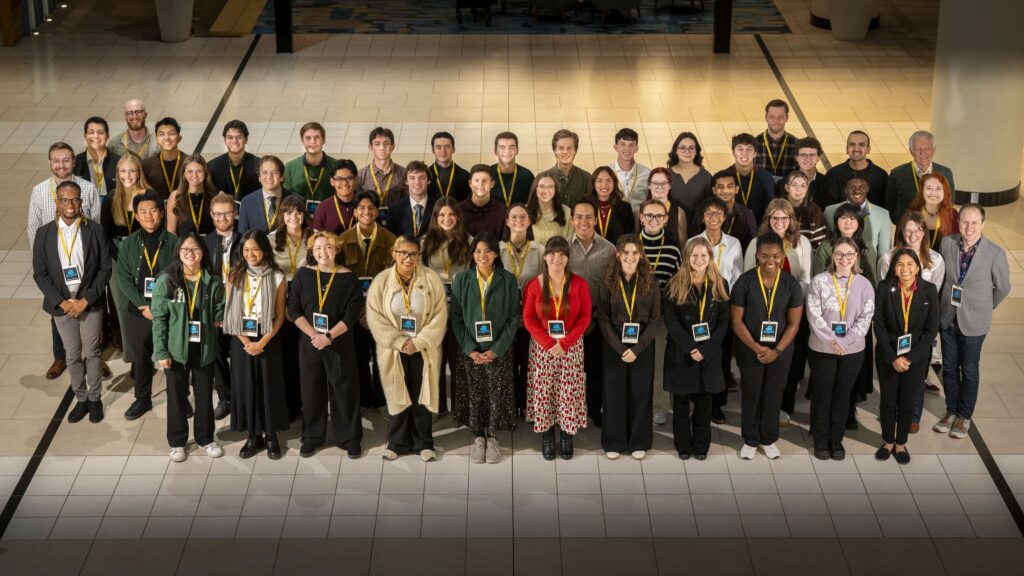We last heard from Frank Etzel in the March 28, 2003 installment of Fanfare, titled “March While You Can.”
He continues his story with the following. In the previous installment, I had returned to the University of Miami (Florida) in January of 1967, unaware of the fact that my days of drum corps were probably over, but a short stint in marching band was about to begin. I know — who cares about marching band? That is how I felt at the time, but these little stories would not have been possible without drum corps, and it illustrates the idea that the marching arts is a physical function, bordering on athletics.
I was a member of the UM ROTC program, and there were so many music majors in ROTC, a decision was made to form a ceremonial band. Volunteers were requested, and I did not respond as I last played contra bass (no marching tubas then), and I could not read music very well. The next week they had only one request — they needed someone to play tenor drum, which I had dabbled in a little.
So I joined the UM ROTC Ceremonial Band: Forty brass and woodwinds, an honor guard and a huge drum line of one snare, one tenor, a cymbal player and a bass drummer (equal to a small quad line!) We worked out a very rudimental street beat and we were always amazed when crowds would cheer at parades. We later found out they were just excited to see young folks doing something other than protesting! One night after practice I was passing a pick-up basketball game (in fatiques and combat boots) featuring five large students.
One of them yelled, “Hey you! You look like you can play basketball. (I am 6’2″) We need another man.” I never played so well in my life, and can now look back at the fact that I played a pick-up basketball game with five people who had lengthy National Football League careers, including the tall lanky guy executing the pick and roll maneuver with me, NFL Hall of Fame linebacker Ted Hendricks (Colts/Packers/Raiders)! The spring of 1967 featured the ROTC “War Games,” and in the mile run somehow the band was competing with only “the elite black beret platoon” (the ROTC equivalent to the Green Berets).
Their leader was exhorting them to show those wimps from the band what America’s finest could do — that real men carried weapons, not silly instruments. This verbal assault on the band kept escalating on, until a brass player and a woodwind player pulled me aside, saying, “We don’t like the things that fellow is saying, and we intend to do something about it.
We both run the mile on the varsity track team, but we want win, place and show! We have noticed you can run a bit, and we’ll keep the pace down until the final quarter, and then we will take off. Just hang with the leaders if you can, and then give it all you’ve got!” The plot unfolded just like a Hollywood movie, although we took a lot of verbal trash and errant elbows getting to the final quarter mile.
The afterburners kicked in, a couple of berets gave chase but blew their wind, and I cruised into the show position with plenty to spare! I can still hear their leader to this day, “The band — the [deleted] band — you lost to the [deleted] band!” Finally, after about an hour of verbal berating, the band cheered from a hilltop as the black berets were marched (in formation) into a pond downstream from the campus sewage plant so they could be covered with, and smell like exactly what their leader equated them to.
My final public marching arts performance occurred at Homestead Air Force Base, which at the time was very large, to perform for the retirement of the base commander. When we formed, it became apparent that the snare drummer had not made it, and what is the National Anthem without a snare roll? On a good day for me, I could do it, but in public? All I needed to do was turn the snare on my wooden drum, and would I do it match grip or traditional? I decided this fellow deserved the traditional, and executed better than I ever believed possible.
Then we played throughout “pass in review” for hundreds who marched by to give their final salute. We played all the Sousa and military standards and I laid down the street beat for what seemed like an eternity. While we were preparing to board our bus, out of the corner of my eye I caught an image heading for us — it was the retiring base commander. I thought we were going to be dressed down for ineptitude, and really got the shivers that he was coming right at me.
At the last instant he outstretched his hand and said, “Young fellow, I want to thank you. This is the first time in my entire career someone played a cadence these people could keep in step with, and you made the final event of my military career one I will always remember fondly.” Whew! I still play my baritone bugle in the basement, and play on my marching snare, but work and family keep me on the sidelines. But who knows about the future? At least I have these memories to fall back on, and I encourage you to make some memories for yourself while you can.
Michael Boo has been involved with drum and bugle corps since 1975, when he marched his first of three seasons with the Cavaliers.
He has a bachelor’s degree in music education and a master’s degree in music theory and composition.
He has written about the drum corps activity for over a quarter century for publications such as Drum Corps World, and presently is involved in a variety of projects for Drum Corps International, including souvenir program books, CD liner notes, DCI Update and Web articles, and other endeavors. Michael currently writes music for a variety of idioms, is a church handbell and vocal choir director, an assistant director of a community band, and a licensed Realtor in the state of Indiana. His other writing projects are for numerous publications, and he has published an honors-winning book on the history of figure skating. His hobbies include TaeKwonDo and hiking the Indiana Dunes. But more than anything, Michael is proud to love drum corps and to be a part of the activity in some small way, chronicling various facets of each season for the enjoyment of others.





